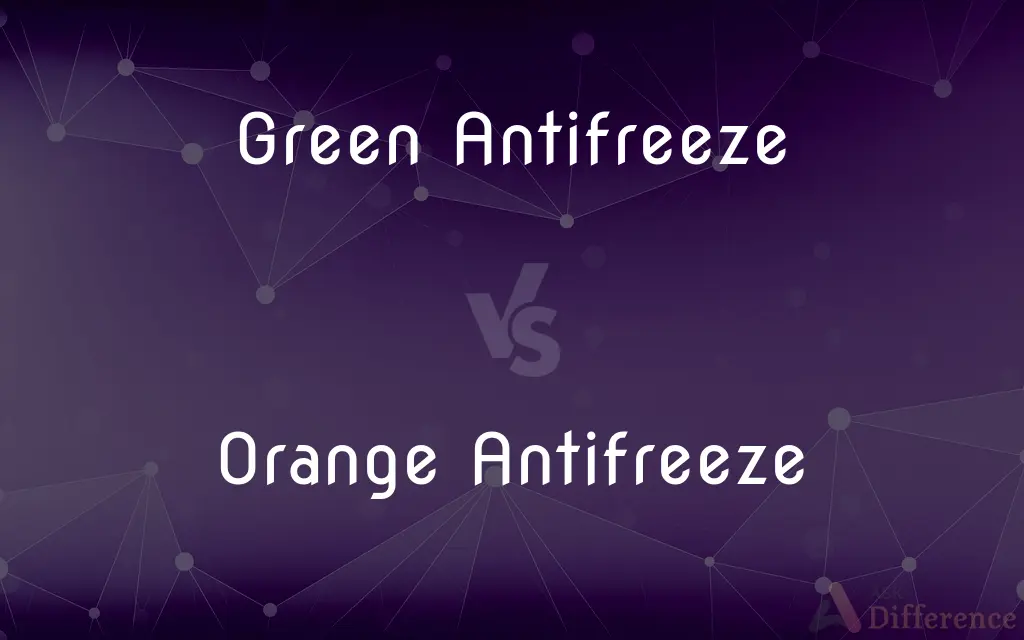Green Antifreeze vs. Orange Antifreeze — What's the Difference?
By Tayyaba Rehman & Urooj Arif — Published on March 5, 2024
Green antifreeze, traditionally ethylene glycol-based with silicates for older cars, prevents rust and corrosion. Orange antifreeze, often dex-cool, uses organic acids for newer vehicles, offering longer life and compatibility with aluminum components.

Difference Between Green Antifreeze and Orange Antifreeze
Table of Contents
ADVERTISEMENT
Key Differences
Green antifreeze is the traditional coolant used in older vehicle models. It is typically ethylene glycol-based and contains silicates that protect against corrosion and rust, especially in metal parts. This type of antifreeze requires more frequent replacement, generally every two to three years, to maintain its effectiveness in engine cooling and protection.
Orange antifreeze, often referred to as dex-cool, is a newer formulation designed for modern engines, particularly those with aluminum components. It uses organic acid technology (OAT) to prevent corrosion and is known for its longer life span, usually lasting up to 5 years or more before needing replacement. This makes it a more convenient and cost-effective option for vehicle maintenance.
The primary difference lies in their chemical composition and intended use. Green antifreeze is best suited for older vehicles that require more frequent maintenance, while orange antifreeze is formulated for newer models and offers extended protection with less frequent changes. This distinction is crucial for vehicle owners to ensure they use the correct type of coolant to avoid engine damage.
Compatibility is another significant factor. Mixing green and orange antifreeze can lead to reduced effectiveness of the coolant and potential damage to the engine. This is due to the chemical reactions that can occur between the silicates in green antifreeze and the organic acids in orange antifreeze, leading to the formation of sludge and deposits within the cooling system.
In terms of environmental impact, both types of antifreeze contain ethylene glycol, which is toxic and requires careful disposal. However, the extended life span of orange antifreeze means less frequent changes and, potentially, a reduced environmental footprint over the life of the vehicle.
ADVERTISEMENT
Comparison Chart
Base Compound
Ethylene glycol with silicates
Ethylene glycol with organic acids
Compatibility
Older vehicles
Newer vehicles, especially with aluminum parts
Corrosion Protection
Silicates for metal parts
Organic acids for broader protection
Life Span
2-3 years
5 years or more
Maintenance Frequency
More frequent changes
Less frequent changes
Compare with Definitions
Green Antifreeze
Compatible with older engine designs.
For vehicles manufactured before 2000, green antifreeze is typically the recommended choice.
Orange Antifreeze
Suited for engines with aluminum components.
Orange antifreeze is recommended for vehicles with aluminum radiators and engines for enhanced corrosion protection.
Green Antifreeze
Requires more frequent replacement due to its formulation.
Due to its chemical makeup, green antifreeze needs changing more often to prevent engine issues.
Orange Antifreeze
Prevents corrosion without the need for silicates.
The organic acids in orange antifreeze provide excellent protection against corrosion in my car’s engine.
Green Antifreeze
Focused on protecting against corrosion and rust.
The green antifreeze in my truck helps prevent rusting of the engine's metal parts.
Orange Antifreeze
A long-life coolant made with organic acid technology for newer vehicles.
The manufacturer specifies orange antifreeze for my modern SUV to ensure optimal engine performance.
Green Antifreeze
Designed to prevent rust and corrosion in metal components.
Green antifreeze is essential for maintaining the engine of classic models.
Orange Antifreeze
Offers extended protection and requires less frequent changes.
With orange antifreeze, I don’t have to worry about coolant replacement for five years.
Green Antifreeze
A coolant containing ethylene glycol and silicates, used in older vehicles.
The mechanic recommended replacing the green antifreeze every two years for my vintage car.
Orange Antifreeze
Designed for compatibility with modern vehicle systems.
For the latest car models, orange antifreeze is the best choice due to its advanced formulation.
Common Curiosities
Can green antifreeze be used in any car?
Green antifreeze is suitable for older vehicles and should be used according to the manufacturer's recommendation to avoid damaging newer engines.
Can I mix green and orange antifreeze?
No, mixing them can lead to sludge formation and reduce the effectiveness of the coolant, potentially damaging the engine.
Can orange antifreeze extend the life of my engine?
Yes, by providing effective corrosion protection and reducing the need for frequent changes, it can help extend the engine's life.
What happens if I use the wrong type of antifreeze?
Using the wrong type of antifreeze can lead to inadequate corrosion protection, overheating, and potential engine damage.
How often should I replace green antifreeze?
Green antifreeze should be replaced every two to three years to maintain its protective qualities.
Is orange antifreeze better than green?
Orange antifreeze offers longer life and is better for newer vehicles, especially those with aluminum parts, but "better" depends on the specific vehicle requirements.
Is it necessary to use antifreeze in my car?
Yes, antifreeze is crucial for preventing the engine from freezing in cold temperatures and overheating in warm temperatures, as well as protecting against corrosion.
Is one type of antifreeze more expensive than the other?
Orange antifreeze may be more expensive upfront due to its longer lifespan and advanced formulation, but costs may balance out over time with fewer replacements needed.
Are there environmental concerns with antifreeze?
Both types contain ethylene glycol, which is toxic and requires proper disposal to avoid environmental harm.
Why does orange antifreeze last longer?
Its formulation with organic acids prevents corrosion more effectively over a longer period without the need for frequent changes.
Share Your Discovery

Previous Comparison
Moss Green vs. Sage Green
Next Comparison
Renaissance vs. Middle AgesAuthor Spotlight
Written by
Tayyaba RehmanTayyaba Rehman is a distinguished writer, currently serving as a primary contributor to askdifference.com. As a researcher in semantics and etymology, Tayyaba's passion for the complexity of languages and their distinctions has found a perfect home on the platform. Tayyaba delves into the intricacies of language, distinguishing between commonly confused words and phrases, thereby providing clarity for readers worldwide.
Co-written by
Urooj ArifUrooj is a skilled content writer at Ask Difference, known for her exceptional ability to simplify complex topics into engaging and informative content. With a passion for research and a flair for clear, concise writing, she consistently delivers articles that resonate with our diverse audience.
















































